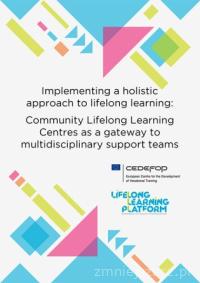The latest Cedefop and Lifelong Learning Platform publication presents the role and significance of Community Lifelong Learning Centres and provides guidelines for developing these types of facilities.
Community Lifelong Learning Centres are presented as one of the solutions that can effectively support adult learning, particularly those from socio-economically disadvantaged groups. These centres are designed to provide flexible, holistic support that goes beyond the area of education itself.
The publication highlights a number of particularly relevant issues in developing Community Lifelong Learning Centres. It was pointed out, among others, that centres should be a welcoming place, focused on the needs of learners, easily accessible, with flexible working hours. The presence of a multidisciplinary team that can provide diverse support is very important.
The publication was prepared by Cedefop and the Lifelong Learning Platform. It is available on the Cedefop website.
In Poland, Local Centres of Knowledge and Education (LOWE) play a similar role. Schools that also function as a LOWE support non-formal adult education, activate adults and local communities to develop basic skills and other key competences. LOWEs’ educational offer is to be based on the diagnosed needs of adults in the local community. LOWE activities are to be targeted in particular to adults from disadvantaged areas with a limited educational offer.
In 2017-2018, 50 LOWEs were established and supported in a pilot project of the Ministry of National Education, co-financed by the ESF. The LOWE model created during this period is to be further developed. In June, a call was announced to support the development and functioning of at least 100 new Local Centres of Knowledge and Education.





